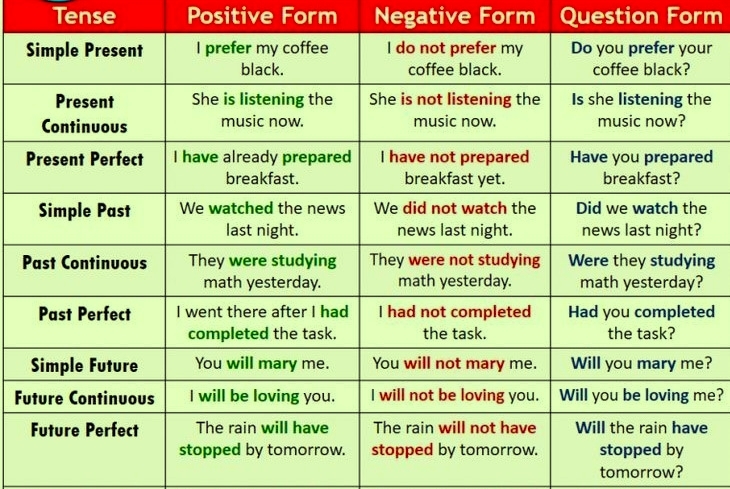Table of Tenses All English Tenses
| Present Simple | Present Continuous | Past Simple | Past Continuous |
| She eats | You are eating | She ate | You were eating |
| She does not eat | You are not eating | She did not eat | You were not eating |
| Does she eat? | Are you eating? | Did she eat? | Were you eating? |
| Future Simple | Conditional Simple | Present Perfect | Past Perfect |
| I will eat | I would eat | He has eaten | He had eaten |
| I will not eat | I would not eat | He has not eaten | He had not eaten |
| Will I eat? | Would I eat? | Has he eaten? | Had he eaten? |

Michelin star awarded to a vegan restaurant in France for the first time – The Week
| Present Perfect Continuous | I have been eating |
| Past Perfect Continuous | I had been eating |
| Future Continuous | I will be eating |
| Future Perfect | I will have eaten |
| Future Perfect Continuous | I will have been eating |
| Conditional Continuous | I would be eating |
| Conditional Perfect | I would have eaten |
| Conditional Perfect Continuous | I would have been eating |
| PRESENT PERFECT CONTINUOUS | He has been eating He has not been eating Has he been eating? | putting emphasis on the duration (not the result) action that recently stopped or is still going on/ finished action that influences the present ———————— |
| PAST PERFECT CONTINUOUS | He had been eating He had not been eating Had he been eating? | action taking place before a certain time in the past interchangeable with past perfect (emphasis on the duration) ————————- |
| FUTURE GOING TO | He is going to eat He is not going to eat Is he going to eat? | planned decision or conclusion with regard to the future |
| FUTURE CONTINUOUS | He will be eating He will not be eating Will he be eating? | action that is going on at a certain time in the future action that is sure to happen in the near future – |
| FUTURE PERFECT | He will have eaten He will not have eaten Will he have eaten? – – | action that will be finished at a certain time in the future |
| FUTURE PERFECT CONTINUOUS | He will have been eating He will not have been eating Will he have been eating? – – | action taking place before a certain time in the future putting emphasis on the course of an action |
| CONDITIONAL PERFECT | He would have eaten He would not have eaten Would he have eaten? – – | action that might have taken place in the past third conditional: If I had seen that, I would have helped |
| CONDITIONAL PERFECT CONTINUOUS | He would have been eating He would not have been eating Would he have been eating? | third conditional unfulfilled result of the action in the if-clause |


